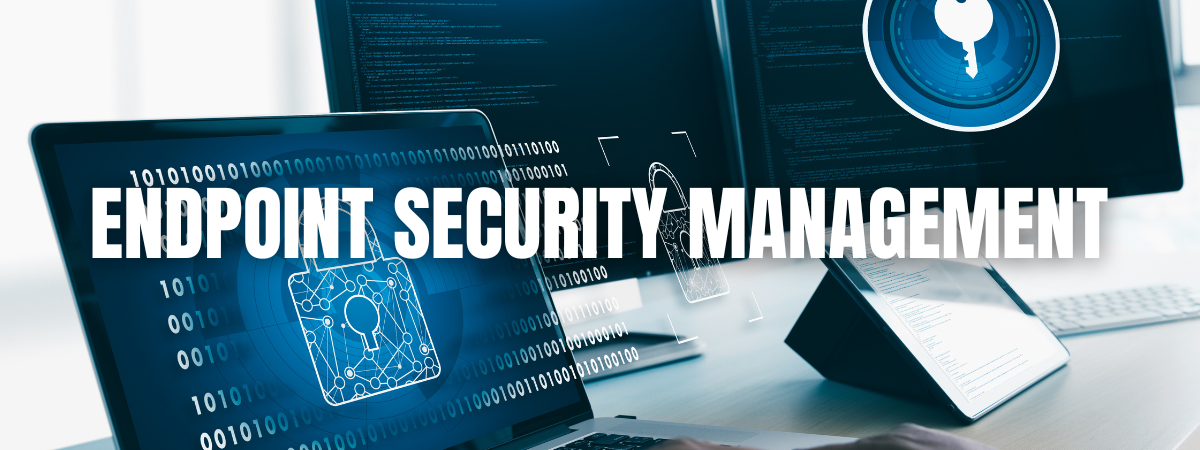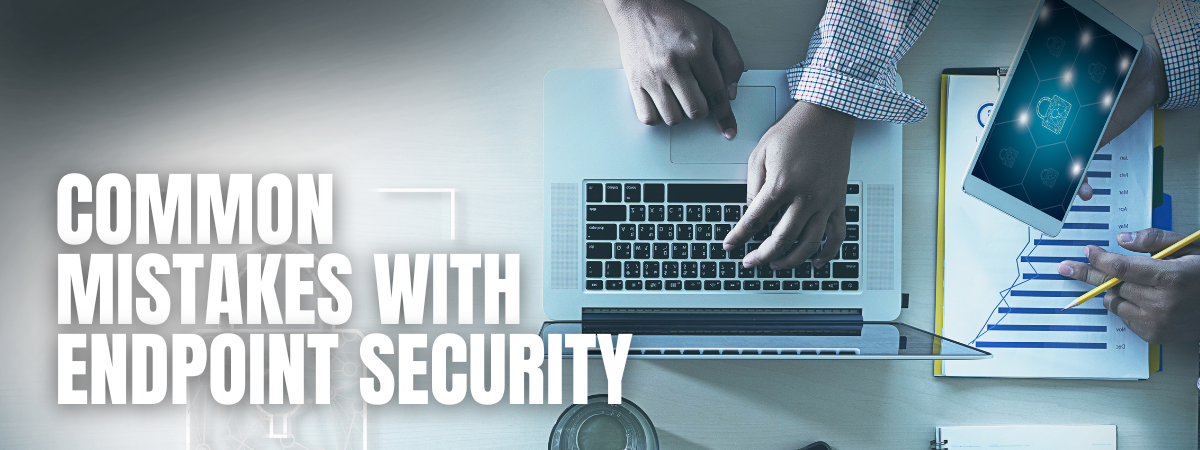
Endpoint security management and why your business needs it.
Endpoint security management stands as an indispensable fortress for businesses, serving as a critical barrier to safeguard their intricate networks and invaluable data against a variety of threats. In today’s dynamic digital landscape, characterized by increasingly sophisticated cyber-attacks and evolving vulnerabilities, the significance of endpoint security cannot be overstated.
Endpoint management encompasses a comprehensive array of strategies, tools, and protocols meticulously designed to fortify the endpoints within a network, including laptops, desktops, mobile devices, servers, and IoT devices.
So, What Is Endpoint Security?
Endpoint security, or endpoint protection, encompasses strategies, practices, and software products designed to safeguard network endpoints. These endpoints include various end-user devices connected to a network, such as tablets, mobile phones, smartwatches, printers, servers, ATMs, and medical equipment.
The goal is to prevent malware, viruses, data breaches, and other cyberattacks that might impact these devices. Endpoint security ensures compliance with relevant regulations by enhancing a company’s cybersecurity.
Why Is Endpoint Security Management Important?
Data protection for starters. Data is invaluable in today’s business environment. Losing access to it can severely jeopardize a company’s survival. A data protection and backup plan is a must.
Increased endpoints. Businesses face challenges due to the growing number and types of endpoints. Remote work and BYOD policies further complicate the landscape.
An evolving threat environment. Hackers continuously devise new methods to infiltrate systems and steal data. Endpoint protection platforms are crucial for safeguarding businesses, considering the potential costs.

So, What Is an Endpoint?
An endpoint is any device that joins a network. As businesses move towards trends like BYOD (Bring Your Own Device) and IoT (Internet Of Things), companies now manage tens or even hundreds of thousands of endpoints. Examples of endpoints include mobile phones, smartwatches, servers, and even IoT-enabled gadgets. Hackers often target these devices due to their vulnerability.
How Does an Endpoint Security Solution Work?
Endpoint security solutions examine files, processes, and systems for suspicious or malicious activity. They provide up-to-date threat intelligence, combining measures like firewalls and antivirus software. Endpoint security acts as the front line in corporate cybersecurity by protecting entry points to organizational networks.
Investing in an endpoint security platform allows businesses to safeguard their networks against external threats, mitigate insider risks, manage multiple devices efficiently, and meet regulatory requirements.

How can your business implement effective endpoint security?
Implementing effective endpoint security management into your business is crucial for safeguarding your network and data. You are going to want to consider the following.
Choose the right endpoint security solution. Evaluate and select a robust endpoint security solution that aligns with your business needs. Consider factors like scalability, ease of deployment, and compatibility with your existing infrastructure. At System Protection Partner, we recommend Microsoft Defender, integrated with Microsoft Intune, Sentinel One, Cisco Umbrella, and Auto Elevate for comprehensive device security. You can view more vendors here.
Regularly Update Software. Keep all endpoint devices up-to-date with the latest security patches and software updates. Regular updates help address vulnerabilities and protect against known exploits.
Deploy Security Baselines. Use security baselines to establish best practice security configurations for devices. These pre-configured settings ensure consistent security across your network.
Implement Tightly Focused Policies. Create endpoint security policies that focus on specific aspects of device security, such as antivirus, disk encryption, and firewalls. Customize policies based on your organization’s requirements.
Set Compliance Rules. Define compliance policies that devices and users must meet to be considered compliant. Include rules related to operating system versions, password requirements, and threat levels.
Integrate with Threat Detection Tools. Integrate your endpoint security solution with threat detection tools like Microsoft Defender for Endpoint. Leverage security tasks to identify at-risk devices and remediate security issues.
Maintain an Inventory of Endpoints. Keep track of all devices connected to your network, and assess applications running on each endpoint, while evaluating their usage.
Remember that endpoint security is an ongoing process. Regular monitoring, incident response, and user education are essential for maintaining a secure environment. Prioritize security practices to protect your business from cyber threats.

What are some common mistakes to avoid in endpoint security?
When it comes to endpoint security, avoiding common mistakes is crucial to protect your organization’s digital footprint.
Neglecting Regular Updates. Failing to keep your antivirus, anti-malware, and operating systems up-to-date is like navigating with an outdated map. Regular updates patch vulnerabilities discovered since the last update and provide essential security enhancements.
Weak Passwords. Weak passwords are the Achilles’ heel of your defense. Opt for complex passwords with a mix of uppercase and lowercase letters, numbers, and special characters. Consider implementing multi-factor authentication (MFA) for an extra layer of defense. Even if passwords are compromised, MFA adds an authentication key that cybercriminals lack.
Insufficient Employee Training. Ignorance is not bliss in cybersecurity. Without proper training, employees might unknowingly click on phishing links or download malware, leaving your gates wide open. Invest in regular security awareness training to educate your staff about the latest threats and safe browsing habits. Your workforce becomes your best line of defense.
Overlooking Endpoint Detection and Response (EDR). Endpoint security isn’t one-size-fits-all. EDR tools actively monitor and analyze endpoint activities, swiftly identifying and responding to potential threats. Think of EDR as having a security detail that actively patrols the premises, not just standing at the gate1.
Too Much Trust in BYOD Policies. Bring Your Own Device (BYOD) policies are common, allowing employees to use personal devices for work. However, blind trust in these devices without adequate security measures is risky.
Lack of Data Encryption. Failing to encrypt sensitive data on endpoints exposes it to potential theft or unauthorized access. Implement robust encryption mechanisms to protect data both at rest and during transmission.
Ignoring the Human Element. Technology alone won’t secure your endpoints. Human behavior plays a significant role. Educate employees about security best practices, encourage reporting of suspicious activities, and foster a security-conscious culture.
Disregarding Incident Response Planning. Having an incident response plan is essential. Prepare for the worst by defining roles, responsibilities, and steps to take during a security incident. Businesses should test and update incident response procedures on a regular basis.
Endpoint security serves as the cornerstone of a robust cybersecurity posture, empowering businesses to uphold the confidentiality and integrity of their sensitive information assets in the face of relentless cyber threats.
By prioritizing endpoint security investments and fostering a culture of cybersecurity awareness and best practices across the organization, businesses can fortify their defenses, mitigate risks, and embark on a path towards sustainable growth and resilience in today’s digital ecosystem.
If you have any questions about safeguarding your businesses network, contact System Protection Partners LLC today to see how we can help bolster your endpoint security.


